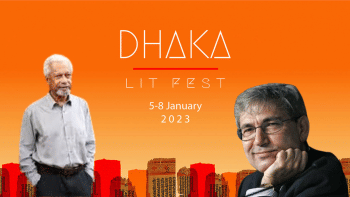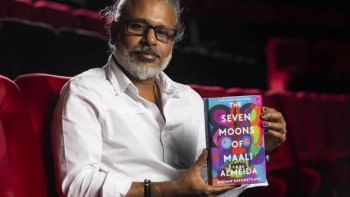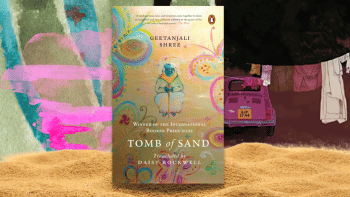Behind the scenes of the Dhaka Literary Festival 2023

The 10th edition of the Dhaka Literary Festival will take place on January 5-8, 2023, with award-winning writers Orhan Pamuk, Abdulrazak Gurnah, Hanif Kureshi, Shehan Karunatilaka, Amitav Ghosh, and Geetanjali Shree expected to be among this year's panelists. As preparations gear up after a two-year hiatus caused by the Covid-19 pandemic, I spoke with the DLF Directors—author, publisher and businessman, Kazi Anis Ahmed; writer, cultural figure and DLF co-founder, Ahsan Akbar; and writer, poet, entrepreneur, women's rights advocate and DLF Director and Producer, Sadaf Saaz.
As directors, each of you comes from different backgrounds—literature, business, finance. How does that impact the character of the event?
Kazi Anis Ahmed: Sadaf is very strong on science, Bangladeshi culture and non-traditional forms such as folk music, travel culture, children's literature. I probably know a bit more about Bangla literature. Ahsan is very strong on contemporary films, art exhibits. But fundamentally it's about the value of tolerance. We believe in having the sturdiness to sit and listen to someone with whom we may vehemently disagree. But that disagreement must be a rhetorical exercise, never violence or personal attacks.
Sadaf Saaz: All three of us are very curious. At the same time, we also highlight the need to reach some kind of excellence. It doesn't happen overnight, it takes years and years of hard work. We're trying to create a platform where young people can find inspiration, get out of their tunnel vision and be exposed to things they might not normally be exposed to.
How do you select the speakers and sessions for DLF?
Sadaf Saaz: It's a mixture. There are some iconic names whose work we've grown up reading, such as Nobel laureates or Booker Prize winners. We want those kinds of conversations to take place in our own country. And then there are up and coming writers and artists whose work deserves to be discovered by more people. Then there are people who are doing important work—for instance we're bringing in Sarah Gilbert, who led the research team for the AstraZeneca vaccine. The story of her work is important because it changed all our lives.
The informal connections are also very important. We're bringing in well known editors and publishers—Alexandra Pringle has been the editor of Bloomsbury for the last 18 years. But we're also bringing in niche, up and coming publishers. Our writers can connect with them, get a chance to meet them.
Kazi Anis Ahmed: Literature is our main area of interest.But we also want to highlight areas of intersection between literature and science, politics, pop culture, human rights, and new media. We have 2-3 fantastic panels on OTT this time. We look into the individuals from Bangladesh and abroad who will be relevant to these conversations, who can talk to each other. Simply the presence of our audience can impact their areas of interest. It is educational for them too.
Ahsan Akbar: We're also trying to brand Bangladesh. Our country tends to get a lot of negative press globally. So we try to look for columnists, curators, cultural impresarios who can talk about the valuable work being done in Bangladesh.
Then there are authors who have released a book after a long time, for instance Pankaj Mishra, who has published a book after 25 years. So the point is to remain relevant, contemporary and on par with the literary festivals around the world.
How will the 10th DLF explore freedom of speech?
Kazi Anis Ahmed: We've been doing this from the very beginning. We've had sessions on the very controversial Digital Security Act. Freedom of expression has both formal and nonformal avenues. What are you allowed to express socially, publicly, and even privately within your family? The issue of self-censorship is a very toxic part of free speech. We will have conversations on all of this.
What goes into planning a literary festival?
Ahsan Akbar: Lots of caffeine. We prepare the lists of speakers throughout the year. Speakers for 2024 have already been prepared. You have to see which books will be coming out in Spring and Autumn of next year. Agents and publishers send us lists and we choose titles that may be relevant to our audience and titles that our audience might want to discover.
Kazi Anis Ahmed: Some of this takes a long time to plan—we had actually invited Orhan Pamuk to DLF back in 2014; he's joining us now in 2022. We have to invite them, help them with visas.
Then there's the actual event, for which Sadaf is the main producer. I take the lead on matters of security, logistics, and government procedures. It scales up immensely when the event nears. And the Ministry of Foreign Affairs has been superbly supportive over the years with visas and security for guests.
One of the most critical decisions is moderators. You get the moderators wrong, and even with the most famous authors, you can have a very dull, problematic or awkward conversation. We have never underestimated our audience. We've tried to bring very experimental writers, such as Will Self and Yara Rodriquez Fowler, and we've been vindicated.
Sadaf Saaz: I'm in the middle of the entire festival tsunami right now. We have almost 100 sessions. Arranging just one of these sessions would take a huge volume of time to confirm the guests, fixing the right topics. Different combinations of people will have different results. You want some known names, you want other people you might not know but will go well in an international panel. But the person you want is not available at the same time slot as others. We have close to 50-60 iterations of these tasks.
You mentioned that there will be a registration fee for visitors this time. Why did you choose to go in this direction?
Sadaf Saaz: We all deeply value literature and culture. And it's not cheap. Artists have to be paid. Hardly one or two people in Bangladesh can survive financially as writers. A registration fee would help make it more sustainable. We want to be able to continue this. It's a festival for Dhaka, so rather than have its future depend on a few major sponsors—which is difficult as it is—we should all be able to have a stake in it.
Anis Ahmed: If you go to the Hay Festival, each session would have a charge of 50-25 pounds, and 50-100 pounds for big name authors. Our audience would have to spend thousands on flights, accommodation, and festival registration fee. But we're bringing these authors to Dhaka, and we aren't charging individual panels. We feel that the audience members who love the DLF so much should be part of the supportive ecosystem. They should take ownership of it along with us, and express that value in a substantive way.

 For all latest news, follow The Daily Star's Google News channel.
For all latest news, follow The Daily Star's Google News channel. 









Comments